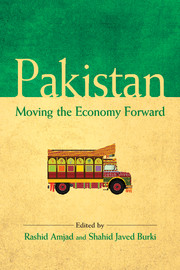Book contents
- Frontmatter
- Contents
- List of figures and tables
- Preface
- 1 Overview
- 2 Failed Economic Promise: Lessons from Pakistan's Development Experience
- 3 Economic Management Under IMF Tutelage: Key Lessons from the Musharraf and PPP Rule 1999–2013
- 4 A Country and an Economy in Transition
- 5 Tackling the Energy Crisis
- 6 Exports: Lessons from the Past and the Way Forward
- 7 The Future Path of Tax Reforms in Pakistan
- 8 Pakistan's Indus Basin Water Strategy: Past, Present and Future
- 9 Economic Governance and Institutional Reforms
- 10 Benefiting from Foreign Direct Investment
- 11 An Analysis of the Remittances Market in Pakistan
- 12 The Prospects for Indo-Pakistan Trade
- 13 Beyond the Poverty Line: A Multidimensional Analysis of Poverty in Pakistan
- 14 Can the New Intergovernmental Structure Work in Pakistan? Learning from China
- Contributors
- Index
13 - Beyond the Poverty Line: A Multidimensional Analysis of Poverty in Pakistan
Published online by Cambridge University Press: 05 May 2015
- Frontmatter
- Contents
- List of figures and tables
- Preface
- 1 Overview
- 2 Failed Economic Promise: Lessons from Pakistan's Development Experience
- 3 Economic Management Under IMF Tutelage: Key Lessons from the Musharraf and PPP Rule 1999–2013
- 4 A Country and an Economy in Transition
- 5 Tackling the Energy Crisis
- 6 Exports: Lessons from the Past and the Way Forward
- 7 The Future Path of Tax Reforms in Pakistan
- 8 Pakistan's Indus Basin Water Strategy: Past, Present and Future
- 9 Economic Governance and Institutional Reforms
- 10 Benefiting from Foreign Direct Investment
- 11 An Analysis of the Remittances Market in Pakistan
- 12 The Prospects for Indo-Pakistan Trade
- 13 Beyond the Poverty Line: A Multidimensional Analysis of Poverty in Pakistan
- 14 Can the New Intergovernmental Structure Work in Pakistan? Learning from China
- Contributors
- Index
Summary
Introduction
The issue of poverty is both simple and complex: at one level, the implicit or explicit objective of most economic policymakers in developing countries is to reduce the levels of poverty in a country; at another level, the tools that should be used are constantly open to debate. The debate in almost all developing countries concerns the correct policy mix between those that target economic growth, which have the potential to reduce poverty as overall income levels rise, and those policies that target poverty directly, such as social safety nets or income transfers.
There is little question that long-term growth reduces poverty, but in a country such as Pakistan, where growth is sporadic at best, the question that arises is what can be done to reduce poverty for those who will not benefit from growth for years or even decades. If we add to this the fact that development has been devolved to the provinces in Pakistan after the 18th Constitutional Amendment, the future of poverty alleviation initiatives is quite simple: Either we explicitly acknowledge that the state is only concerned with economic growth and wait for growth to reduce poverty—while pursuing intermittent and idiosyncratic poverty interventions that assist the poor but do little to move them out of poverty—or we clearly focus the limited resources of the state on explicitly targeted poverty interventions.
The purpose of this chapter is not to evaluate poverty reduction initiatives in Pakistan or to predict what will happen to poverty in the country over the next decade. Rather, we want to see what has been happening to poverty over the last decade by looking at poverty in unique ways: First, we look at what has been happening to poverty if we expand the definition of poverty to include not just income but also other basic necessities such as health and education.
- Type
- Chapter
- Information
- PakistanMoving the Economy Forward, pp. 332 - 357Publisher: Cambridge University PressPrint publication year: 2015
- 1
- Cited by



